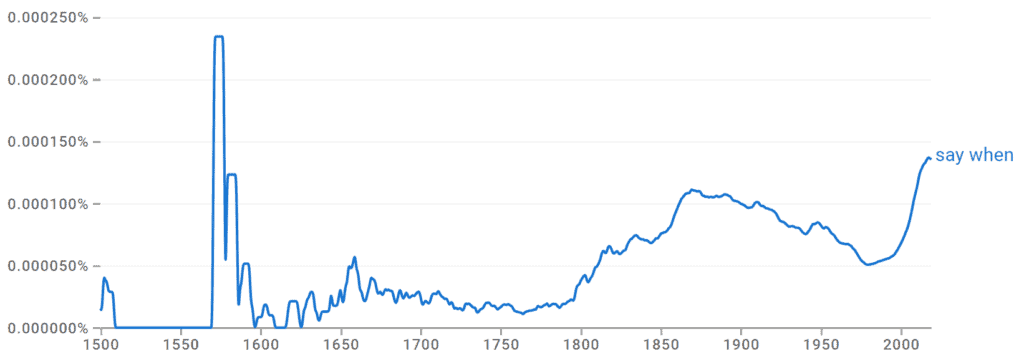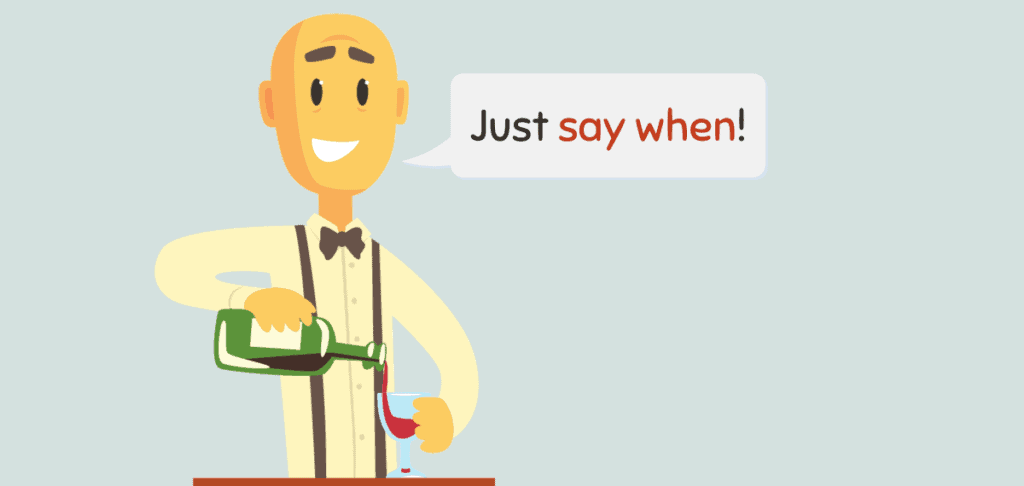The idiom say when is a phrase used to indicate when you’ve had enough of something, often used when someone’s pouring a drink or serving food. It’s a way of politely communicating your satisfaction or desire to stop a particular action.
Imagine being at a dinner table where someone is carefully ladling out the soup into your bowl. As they continue to pour, they may pleasantly inquire, “Say when!” This is your cue to let them know when to stop based on your preference. Originating from social settings and simple gestures of politeness, this phrase has found its way into more general uses and is a common idiom today.
Idioms, like say when, are phrases where the words together have a different meaning than their individual definitions. They infuse our language with depth and emotion, helping messages to be conveyed in a more animated way.
Understanding and using idioms correctly can greatly enhance your communication skills. So, in this article, we’ll delve into the meaning, origin, and usage of the idiom “say when” with illustrative sentence examples.
The Meaning of the Idiom Say When

Say when is short for say when to stop pouring. You’ll find it used more in the context of food and drinks to let the server know when you have enough, but it can be used in other contexts, too.
During my first massage, the therapist wanted to start off easy, and when she began applying pressure to certain muscles, she told me, “Say when!” to let her know when it hurt.
Say When Origin and Etymology

Rooted in social etiquettes and gatherings of the 1500s, the phrase “say when” originated in dining scenarios, where one would pour beverages or serve food to another. To avoid over-pouring or serving too much, the server would ask the recipient to say when they’ve had enough. This courteous gesture gradually became an idiom in the 19th century, symbolizing the act of seeking direction.
Synonyms for Say When
Want to shake things up and use alternatives to say when? Here are some synonyms that hold similar meanings.
- Let me know when
- Tell me to stop
- Indicate your limit
- Give me a sign
- Say uncle
- Signal when it’s enough
Just Say When: Examples in a Sentence

Here are ten scenarios to fuel your imagination with how to use say when in a sentence.
- As he drizzled the chocolate sauce over her ice cream, he teased, “Just say when!” knowing she never would.
- When you’ve gathered enough information, just say when, and I’ll stop the research.
- The hairstylist held up the scissors, smiling, “I’ll start trimming, but you’ll need to say when.”
- As the music blared, he turned to her, shouting, “Say when if it’s too loud for you!”
- I can keep listing restaurants for tonight’s dinner; just say when you hear one you like.
- Feel free to adjust the room’s lighting, or I can do it, and you just say when it’s perfect for you.
- I’ll keep adding spices to the mix as you taste test. Just say when it’s spicy enough!
- During their brainstorming session, he said, “Throw ideas at me and say when you feel we’ve got enough!”
- Candace watched as the waiter grated parmesan over her pasta and waited patiently for her to say when.
- As she flipped through the color swatches, the designer prompted, “Say when you spot your dream shade.”
Just Say When
Say when is more than just an idiom. With its origins in polite society and its evolution into a versatile expression, it’s a tool to encourage interaction and collaboration. Next time you’re pouring a drink, sharing an idea, or just seeking some sort of direction, remember to sprinkle in some say when magic. Craving more idiomatic insights? Don’t just stop here! Scroll through our treasure trove of phrase guides to keep the conversational ball rolling!
Check out some others we covered:
